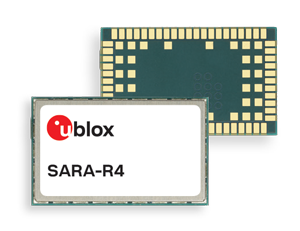The SARA‑R410M‑83B dual-mode LTE‑M, NB-IoT modules secure the IoT from end to end.
Thalwil, Switzerland, and Sydney, Australia – February 13, 2020 – u‑blox (SIX:UBXN), a global provider of leading positioning and wireless communication technologies, today announced certification of its dual-mode SARA‑R410M‑83B (https://www.u-
With frequency bands 3, 5, 8, 20, 28, conformance to RED and certification for NCC, the product can also be used in Europe and Taiwan.
 Recently introduced NB-IoT features have been tested and approved by Telstra. Release Assistance Indicator gives the application the option to terminate the connection as soon as the uplink message is sent.
Recently introduced NB-IoT features have been tested and approved by Telstra. Release Assistance Indicator gives the application the option to terminate the connection as soon as the uplink message is sent.
“The ability to release the network connection quickly and reduce power consumption is critical for our customers requiring extended battery life, particularly in remote areas. Additionally, u-blox’s customized implementation of embedded secure MQTT protocol enables quick development of secure and reliable data transmission to AWS and MS Azure cloud platforms,” says Andrew Suttle, Country Manager, Australia and NZ.
Built‑in device and data security:
The unique immutable root of trust and lightweight key exchange makes the SARA-R410M-083B modules ideal for mission‑critical IoT solutions. This provides the foundation for a trusted set of advanced security functionalities.
Rado Sustersic, Product Manager, Product Center Cellular at u‑blox stressed: “The scalable, pre‑shared key management system offers best‑in‑class data encryption and decryption, both on‑device as well as from‑device‑to‑cloud. Utilizing the latest (D)TLS stack and cipher suites with hardware‑based crypto acceleration provides robust, efficient, and protected communication.”
Future‑proof solutions via LWM2M with secure uFOTA service:
Customers can future‑proof their solutions by means of uFOTA (firmware over the air) client/server firmware updates, using LWM2M, a light and compact protocol ideal for IoT applications. uFOTA is a complete end-to-end u-blox service for remotely updating deployed modules to future firmware releases, with additional security provided between module and server via pre-shared secure keys. And with manufacturing in ISO/TS 16949‑certified production sites in Europe and an extended operating temperature range of –40° C to +85° C, it is ideal for secure long life industrial applications.






